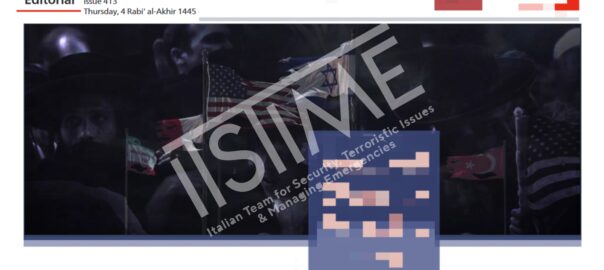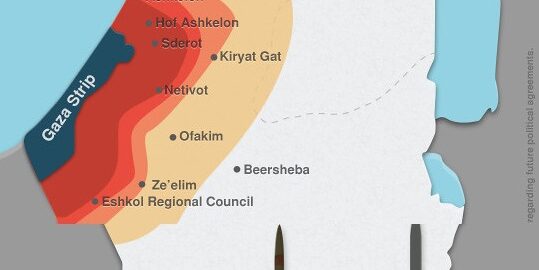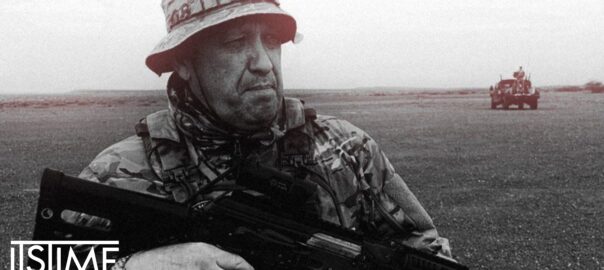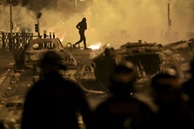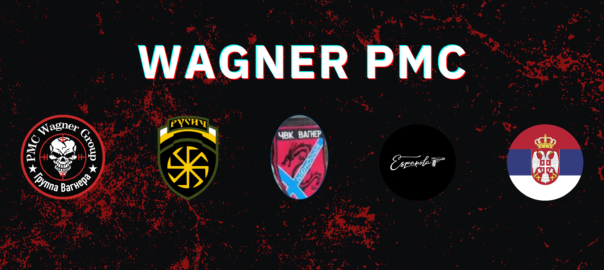Despite the death of Yevgeny Prigozhin on 23 August, PMC Wagner continued to operate in the African and Middle Eastern theatre, except for the troops that were engaged in Ukraine and are now stationed in Belarus. In recent months, however, the Ministry of Defence has undertaken a plan to restructure the PMC Wagner network, preserving its tactical-operational assets and the benefits derived.
Continue readingCategory Archives: Security
Islamic State Blitzkrieg Propaganda – by F. Borgonovo, G. Porrino & S.R. Lucini
The recent Hamas attack has brought the Israeli-Palestinian conflict back into the international spotlight, and this has awakened the communication of the main jihadist groups. With al-Qa’ida supporting Hamas and its actions, a statement on the attack by the Islamic State was expected. On 20th October, through the publication of the 413th issue of al-Naba, an official newspaper issued by the Central Media Office of the Islamic State, IS expressed its position.
Continue readingIl cambio di strategia di Hamas verso il jihad globale -by Giovanni Giacalone
L’eccidio di civili perpetrato da Hamas lo scorso 7 ottobre ha sconvolto l’opinione pubblica e la comunità internazionale, infiammando nuovamente l’eterna questione israelo-palestinese e riportando al centro dell’attenzione mediatica e politica il problema del terrorismo di matrice islamista, messo nel dimenticatoio dall’emergenza Covid e dalla guerra in Ucraina. In molti hanno commesso l’errore di credere che il problema del jihad globale fosse sparito dopo la disfatta territoriale dell’ISIS nel Siraq (che non implica però una sua sconfitta), ma la realtà è ben diversa.
Continue readingWar and peace in the global village. Second half – by Giacomo Buoncompagni*
Shortly after the clashes in Ukraine, the apparently silent Israeli-Palestinian conflict reignited, at least in the Western media. A few months later, more blood, death and hostages between polarised information and a desperate plea for peace. Diversity has historically been a potential source of friction and misunderstanding.
Continue readingHamas come Isis – by Marco Lombardi
Un’intervista per il Messaggero.
Continue readingHamas attack in Israel: European security perspectives – by Maria Chr. Alvanou
As the world is watching Hamas attacking Israel in an unprecedent violent terrorist campaign within its borders, it is important to understand that the situation is also a security crisis from a European perspective. The following points show why Hamas actions are dangerous for European security and parameters that need attention in order to prevent and manage the threat created:
Continue readingGang o aggruppamenti predatori urbani? – by Giovanni Giacalone
Cosa c’è dietro il fenomeno delle violente aggressioni a scopo di rapina che sta caratterizzando i grandi centri urbani italiani. Negli ultimi mesi si è parlato molto di aggressioni a scopo di rapina, spesso in pieno giorno e in zone centrali delle grandi aree metropolitane italiane e messe in atto da gang e dalle cosiddette “baby-gang”, termine quest’ultimo che come vedremo risulta quanto meno inappropriato se non errato.
Continue readingTime to be realistic about Swarmcast2.0 – by Ali Fisher
For all the meetings, presentations and reports from embedded academics and industry groups, purporting to show success against Salafi-Jihadi groups, the movement is still comfortably able to disseminate content through Swarmcast2.0.
The Western metanarrative has long been accepted by the orthodoxy of Terrorism Studies. However, while claims of success resonate at events hosted by industry funded bodies, the challenge encapsulated by Swarmcast2.0 remains. Salafi-Jihadi groups and the media mujahidin maintain persistent networks which function across multiple platforms simultaneously.
Continue readingWagner Digital Ecosystem: what happens after Prigozhin’s Death – By Federico Borgonovo & Giulia Porrino
After the March of Justice, announced on June 23, the evolution of the relationship between Russian President Vladimir Putin and PMC Wagner head Yevgeny Prigozhin was discussed at length. On August 23, exactly two months later, one of the private jets on which Yevgeny Prigozhin and Dmitry Utkin, considered his right hand, were traveling crashed en route between Moscow and St. Petersburg.
Continue readingSoccer hooliganism episode in Athens: lessons from a security perspective – by Maria Chr. Alvanou
An episode of hooligan violence, with a 22-year-old man dying from multiple stab wounds took place in Athens, Greece, the night before Tuesday’s UEFA Champions League qualifying soccer match between teams AEK (Greece) and visiting Dinamo Zagreb (Croatia).[1] Additionally to one man violently losing his life, there are 8 people injured (Croatian and Greek) and the clashes were especially violent.
Continue readingSocietà Radicali: dalla Francia alla guerra russo – ucraina – by Barbara Lucini
Le rivolte occorse in Francia alla fine di giugno mostrano e confermano che a livello globale, certamente europeo, le società stanno diventando sempre più radicali e violente.
Continue readingPMC Wagner and Allied Mercenaries, Aftermath of the March by – Federico Borgonovo & Giulia Porrino
During the Russian-Ukrainian conflict, PMC Wagner exploited online and offline support of some military groups, including:
- Española, a parallel battalion of Russian ultras led by Alexander Shum and with a special training centre near San Petersburg.
- Rusich, a reconnaissance, sabotage and assault group, directly attached to the PMC Wagner.
- Serb members, active since the deployment in Syria. Those are linked with several ultras’ communities.
- Níðhöggr (Nidhogg), a little unit near to the Scandinavian right-wing militia funded by an actual Wagner member.
All these units were orbiting around the PMC Wagner as embedded support groups. Starting from their online propaganda we theorized a pro-Wagner alliance system (figure 1).
Continue reading

